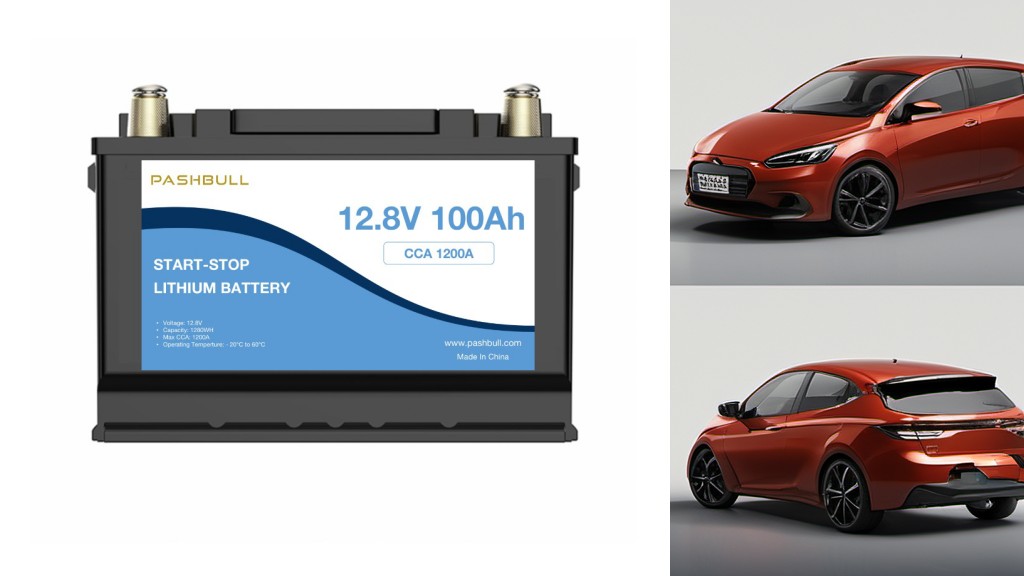Cars have brought great convenience to our lives. How much do you know about their batteries? In the past, cars used lead-acid batteries, which had few cycles and often needed to be replaced every 2-3 years. With the development of technology, a new alternative battery has emerged, that is, lithium ion car batteries.
Let’s explore the key differences and considerations between lithium-ion and lead-acid car batteries, providing valuable insights for automotive enthusiasts, environmentalists, and individuals interested in alternative energy solutions.
Definition of Lithium Ion Car Batteries and Lead-Acid Car Batteries
Lithium-ion batteries are revolutionary power sources known for their high energy density and lightweight nature, making them ideal for electric vehicles and portable electronics. On the other hand, lead-acid batteries have been the traditional choice for automotive applications, known for their robustness and cheap price.
Importance in Automotive Technology and Sustainable Energy Solutions
Both lithium-ion and lead-acid batteries are integral to the advancement of electric vehicles and sustainable energy solutions. Their efficiency and environmental impact have far-reaching implications for the future of automotive technology and the promotion of sustainable energy.

Performance and Longevity Comparison
A. Power Output and Efficiency of Lithium-Ion Batteries
Lithium-ion batteries boast high power output and exceptional efficiency, providing the necessary energy for electric vehicles to achieve impressive performance and range. Their advanced technology contributes to the overall driving experience and the widespread adoption of electric mobility.
B. Durability and Maintenance of Lead-Acid Batteries
Lead-acid batteries are renowned for their durability and low price, making them a cost-effective choice for certain applications. However, their overall performance in electric vehicles may not match the efficiency and longevity offered by lithium-ion counterparts.
C. Impact on the Performance of Electric Vehicles
The choice between lithium-ion and lead-acid batteries significantly impacts the overall performance of electric vehicles. Lithium-ion batteries contribute to enhanced acceleration, longer driving range, and reduced weight, whereas lead-acid batteries may fall short in meeting the demands of modern electric mobility.
Environmental Impact and Sustainability
A. Analysis of the Environmental Footprint of Lithium-Ion Batteries
Lithium-ion batteries present a more favorable environmental footprint compared to lead-acid batteries, primarily due to their energy efficiency and lower emissions during operation. Their contribution to sustainable energy aligns with the global push towards reducing carbon emissions and promoting eco-friendly transportation solutions.
B. Comparison of Recyclability and Disposal Methods
When assessing recyclability and disposal methods, lithium-ion batteries demonstrate a higher potential for recycling and a reduced environmental impact compared to lead-acid batteries. This underscores their role in contributing to sustainable energy practices and minimizing waste in the automotive sector.
C. Role in Promoting Sustainable Energy and Reducing Carbon Emissions
The adoption of lithium-ion batteries in electric vehicles plays a vital role in promoting sustainable energy and reducing carbon emissions. Their integration into automotive technology signifies a significant step towards achieving a greener and more environmentally conscious transportation ecosystem.

Cost Analysis
A. Initial Investment and Long-Term Cost Implications
The initial investment in lithium-ion batteries may be higher than lead-acid counterparts; however, the long-term cost implications reveal a different narrative. Factors such as lifespan, maintenance, and environmental impact position lithium-ion batteries as a more economically viable choice over the lifespan of an electric vehicle.
B. Consideration of Factors like Lifespan and Maintenance
When considering factors like lifespan and maintenance, lithium-ion batteries exhibit superior longevity and reduced maintenance requirements, resulting in lower overall costs for car owners over the years of ownership. This aspect is crucial in evaluating the financial implications for both car owners and the automotive industry.
C. Financial Implications for Car Owners and the Automotive Industry
The financial implications of choosing between lithium-ion and lead-acid batteries extend to car owners and the automotive industry at large. While the initial investment may vary, the overall cost analysis favors lithium-ion batteries, aligning with the pursuit of sustainable and cost-effective energy solutions in the automotive sector.
Conclusion
A. Recap of Key Differences and Considerations
In summary, the comparison between lithium-ion and lead-acid car batteries highlights significant differences and considerations that shape the landscape of automotive technology and sustainable energy solutions. These insights are crucial for car enthusiasts, environmentalists, and individuals seeking a comprehensive understanding of alternative energy solutions in the automotive sector.
B. Implications for Car Enthusiasts, Environmentalists, and the Future of Automotive Technology
The implications of choosing between lithium-ion and lead-acid batteries extend to various stakeholders, including car enthusiasts and environmentalists. Moreover, the future of automotive technology is intricately linked to the adoption of sustainable energy solutions, where lithium-ion batteries play a pivotal role in driving innovation and environmental stewardship.
In conclusion, From a long-term economic perspective, lithium ion car batteries will be the best choice. Of course, if you consider price, lead-acid batteries are a wise and economical choice.


